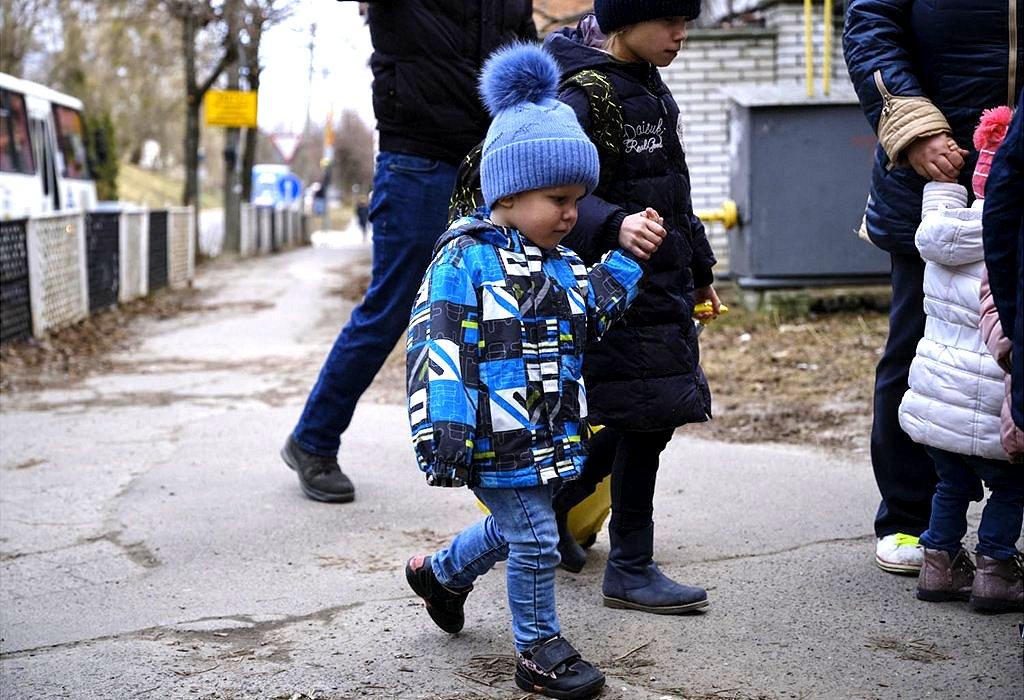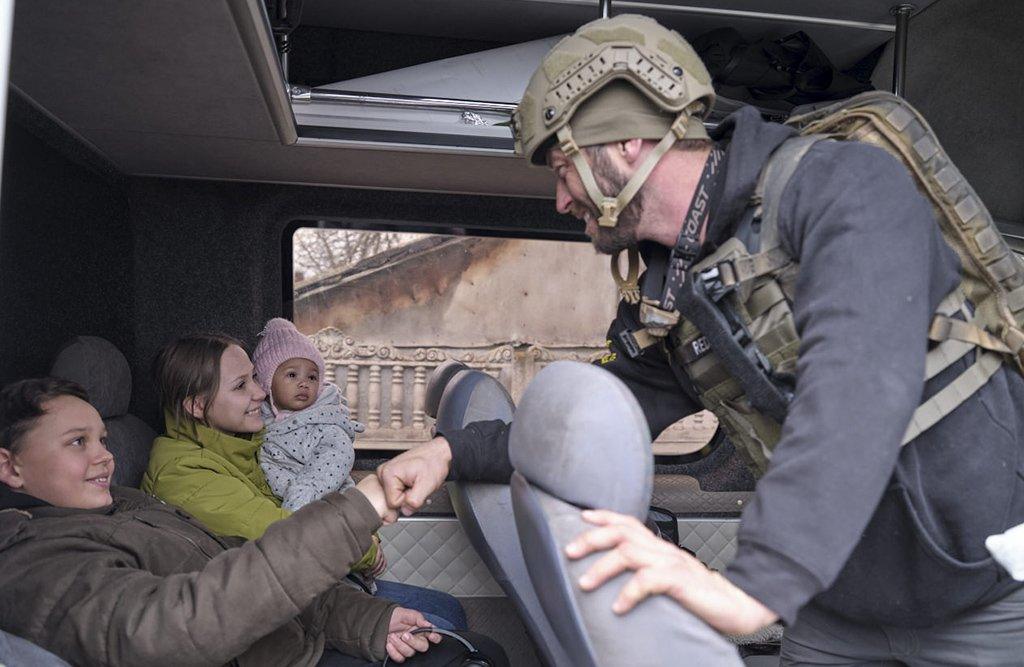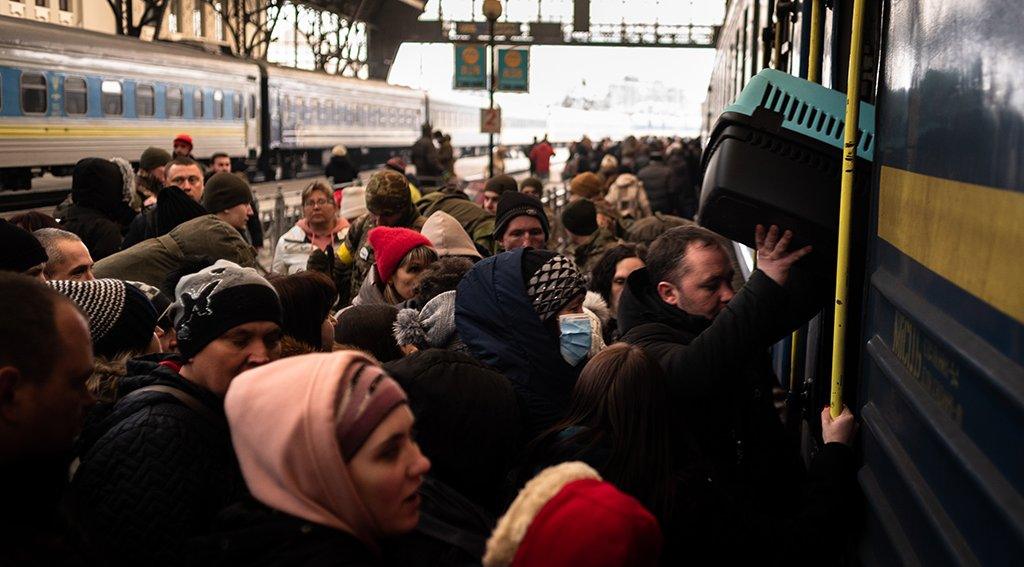Ukraine: Thousands of vulnerable children unaccounted for
- Published

Children evacuated from an orphanage are led to safety
Traffickers are targeting parentless children on the Ukraine-Poland border, says a group evacuating orphanages in the war zone.
A team of US military veterans is helping to organise safe passage for the estimated 200,000 children in Ukraine's orphanages and foster homes.
But they say thousands are unaccounted for and fear some may already have fallen prey to people traffickers.
Kyiv says it is tightening procedures for vulnerable children.
Tens of thousands of children in Ukrainian state care are in desperate need to get out of the country
Aerial Recovery, a team of former US military veterans who are assisting vulnerable people fleeing the crisis, is working with the Ukrainian authorities to establish a system that will make it easier to keep tabs on the country's parentless children.
"The government doesn't really have the capacity to deal with the problem," says Jeremy Locke, the team's chief of operations.
The team is working with Salam, a charity which helps refugees. It told the BBC that children dropped at the Ukraine-Poland border by well-meaning organisations are being targeted.
"They're very easy prey - they're looking for assistance," says Martin Kvernbekk, of the charity. "So if you're an adult with some food or refuge, they will come with you. They don't know any better."
He has heard about children going missing from a number of different sources, and reports of people smugglers wearing reflective vests and pretending to belong to organisations helping the relief effort.
"The gangs are very advanced - it's big, well-financed networks that do this for a living. They're good at this in peace time," he says. "Now it's a war, it's chaos, and they're exploiting the fact there is disorder to be able to snatch more kids and women."
Mr Kvernbekk also points out that although most men aged 18-60 are not allowed to leave Ukraine because they have to fight, any man who has three or more children with him can pass through. But no proper vetting is taking place at the country's borders.
"There is no way to check if that man is actually the parent of the kids," he says.
In a speech earlier this week, the EU Commissioner for Home Affairs, Ylva Johansson, voiced concerns. "We also have some reports of criminals taking orphans from orphanages in Ukraine, crossing the border pretending that they are relatives to the child and then using them for trafficking purposes," she said.
An absence of vetting procedures for those who volunteer to help or house refugees once they have crossed the border only compounds the problem.
"Everybody knows it's going on, but it's difficult to say the extent because of the chaos here. The authorities are trying to track what's happened to all of the children [but] there is no paper trail," Mr Kvernbekk says.
The Ukrainian authorities are now establishing a system with the help of NGOs to process displaced children and setting up safe areas in the east of the country.

A member of the Aerial Recovery team fist-bumps one of the children being evacuated
On Wednesday, Aerial Recovery discussed plans to strengthen safety protocols and create safe zones in Lviv with the regional minister for child services.
"That way we don't have to take these children over borders and we can ensure that Ukraine is in control of where their children are going," Mr Locke says.
During that meeting the authorities expressed concern that 5,000 children on their records were unaccounted for, he says.
Nobody knows what has happened to them. "They're either casualties of war, or they've slipped across the border, or have been taken out of the border by smugglers or by people that are doing it the wrong way," Mr Locke told the BBC.
Volodymyr Lys, regional head of service of children's protection under the ministry of social policy in Lviv, told the BBC that the first 10 days of war were difficult, but it had improved.
"It was very very chaotic. They didn't know where the kids were going. Nobody felt like they had worked out a system. Now there's enough NGOs, there's enough volunteers, everybody knows what they're doing," he says.

Refugees struggle to board a train at Lviv's main station
He believes more than a million children remain in conflict zones in the country. Most are now being evacuated to the east, rather than abroad. Mr Lys says currently there are 550 orphans and foster children sheltering in the Lviv region, and they are expecting that number to double. He says his team spent 10 days at Lviv train station comforting, feeding and sheltering children. "The whole of Ukraine is absolutely horrified at what is going on," he says.
When asked if children fleeing abroad could be trafficked or forced into prostitution, he admits: "Of course there is a risk of that, especially if they are travelling without their legal guardian or come unaccompanied.
"There's really not a way to know for sure for now how many are missing and the authorities are now trying to track what's happened to all of the children in the system," says Martin Kvernbekk.
Former soldier and aid worker Rob Lawrie is volunteering alongside Aerial Recovery in Ukraine. "What we've seen is smugglers using the war in Ukraine as a shield to move in on the most vulnerable. Hopefully things are now in place to get these youngsters out of dangerous areas and make sure they can't fall into the hands of traffickers."
Listen to The Smugglers' Trail with Sue Mitchell and Rob Lawrie starting Friday 11 March on BBC Radio 4 - listen on iPlayer
Follow Sue Mitchell on Twitter, external